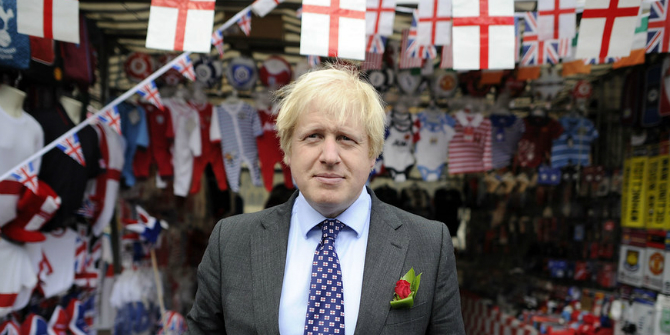
Boris Johnson’s adoption of a No-Deal exit as a viable policy option can only be described as Brexit Britain’s Trumpian moment, writes John Ryan (LSE).
US President Donald Trump told a crowd in Washington: ‘Boris is good. They call him Britain Trump.‘ German English-language service Deutsche Welle published an article with the title ‘Boris Johnson’s clowning glory‘. Seen as Donald Trump’s boastful mini-me by many with no electoral mandate from the British people for No Deal and with a record of incompetence, ineptitude and intellectual laziness – Boris Johnson has nevertheless just been elected by the Tory party membership to become the Conservative party‘s leader and then by default the UK’s prime minister.
In what can only be described as Brexit Britain’s Trumpian moment, Johnson showed his political opportunism by adopting the Brexit Party’s key policy of No Deal Brexit as the way to stem the rise of arch-Brexiteer Nigel Farage and to prevent the terminal decline of the Conservative party. Johnson’s lack of a viable plan for government besides a No Deal Brexit raises the prospect of a repeat of his tenure as Mayor of London in which he achieved little in eight years and in which he wasted money with little in the way of tangible benefits for Londoners.
Many adversaries, as well as colleagues of Boris Johnson, feel that he is personally unfit to be Prime Minister. The Guardian recently ran a series of articles during the Conservative leadership election pointing out his political and personal deficiencies. They say that he is a habitual liar, a cheat, a cruel betrayer of the women in his life, a politician who connived in a bid for a court order to suppress mention of a daughter he fathered, a do-nothing mayor of London and the worst foreign secretary in living memory. He was described as a diagnosed narcissist whose entire political career has been constructed through the prism of personal opportunism. Johnson as foreign secretary contributed to a British national Nazanin Zaghari-Ratcliffe, the British-Iranian citizen being incarcerated in Iran after he wrongly stated she was teaching journalism in the country, a comment cited by Iran to undermine her case.
There are known to be several Conservative MPs who have deep reservations about serving under a prime minister who is prepared to leave the EU without a Brexit deal on 31 October. An early vote of no confidence would trigger a 14-day period during which someone else – including Labour’s Jeremy Corbyn – could try and form a government which wins the support of the Commons. If that cannot be achieved, then the UK would face a general election. But to prevent a No Deal Brexit, there would need to be a new prime minister in place who is prepared to go to the EU to ask for a further extension before the 31 October 2019 deadline is reached.

Holding an election out of his own volition would be dangerous for Johnson with the poor state of the economy, the weakened pound, businesses leaving or not investing in the UK, the sad state of health care, council cuts to old-age care, rising debt and corroded public finances, the lack of police on the streets, climate change, supporting Trump’s foreign policy adventures, and dealing with China, Iran, Israel, Russia and Saudi Arabia.
The political fallout associated with the economic hit of a Johnson-induced No Deal Brexit should not be underestimated. We know that higher barriers to trade, investment and migration will damage UK productivity growth; and that British consumers will be forced to buy more expensive imports or lower quality British alternatives, hitting living standards. It will be a mix of the two, but that mix is hard to quantify. What is more, the Brexit referendum in 2016 coincided with robust global growth. With signs of a slowing global – and European – economy, the costs of Brexit would be more acute now. The immediate damage would be enormous, if only because of the uncertainty and the lack of preparation, both among governments and companies both in Britain and the EU.
Newly appointed members of the Boris Johnson cabinet do not inspire confidence. Former Brexit secretary Dominic Raab, now foreign secretary, was mocked for confessing he “hadn’t quite understood the full extent” of the UK’s dependence on the Dover-Calais crossing for trade. Former development secretary and staunch Brexiteer Priti Patel now home secretary made the outrageous suggestion that Britain should use the threat of food shortages to force Ireland to change its approach to Brexit. The tragedy of the Irish famine which caused the death of over a million Irish men, women and children was one of the most shameful episodes in British history.
Some people appear as stupid or ignorant because that is exactly what they are. Ignorant people can succeed against the odds if success depends on other, unrelated qualities. Boris Johnson is the populist’s populist and has been described as both the thinking man’s idiot and the idiot’s thinking man. For many inside and outside Britain, the Tory party seems to be governed by a self-involved clique which includes Boris Johnson that rewards group membership above competence and self-confidence above expertise.
Clearly, MPs damaged Johnson‘s hopes of forcing a No Deal Brexit through Parliament on 18 July 2019 when they voted by a large margin to prevent a future Johnson government from suspending it to prevent it from voting against No Deal. But that does not mean Parliament can legislate to stop No Deal without the government’s consent. There were some 47 Conservative MPs who defied the whip: 17, including the former digital minister Margot James, voted for the plan, while another 30 abstained, most notably Cabinet ministers at the time of the vote Philip Hammond, David Gauke, Rory Stewart and Greg Clark. Any plan by Boris Johnson to leave the EU without a deal would result in Parliament passing a vote of No Confidence in his government, with a high chance of success. That would almost certainly precipitate a General Election, in which a new mandate would be offered to ‘the people’, either to revoke Article 50, or to offer the nation a new referendum on Brexit.
Johnson wants to ensure there is no hard Irish border, even in a No Deal scenario, through so-called alternative arrangements – technological approaches by which customs and regulations checks would take place automatically, or away from the land border between the Republic of Ireland and Northern Ireland. The consensus among experts in the UK and the EU is that such technology is several years away from being useable, and there is not the slightest chance of a system being in place for 31 October 2019. Analysts at JP Morgan investment bank said the two Prime Ministerial candidates’ quest for a Brexit withdrawal agreement without the “Irish backstop” was like hunting a unicorn. “A unicorn with a lick of paint is still a unicorn,” analysts Malcolm Barr and Allan Monks wrote in a note sent to clients.
Johnson has got a technical working majority of two, which could fall to one after a by-election in Brecon on 1 August 2019. Last Wednesday Chancellor Philip Hammond, International Development Secretary Rory Stewart, Justice Secretary David Gauke and de facto deputy Prime Minister David Lidington all handed in their resignation after Theresa May’s final Prime Minister’s Questions and before May formally handed in her resignation to the Queen. A total of 17 ministers from Theresa May’s Government, including Penny Mordaunt, Liam Fox and Jeremy Hunt, were either sacked, resigned or retired. That is a purge of unprecedented scale. Dominic Cummings, the former head of the Vote Leave campaign, was appointed Senior Adviser to Boris Johnson. This is a now a radical right-wing Vote Leave Brexit government. Even before he stepped foot through the door of No.10, Johnson knew that others could drive the narrative of his premiership.
At Eton, notes James Wood in the London Review of Books, they were taught to impose themselves on the world with “effortless superiority”. But these people fall short too often. The trouble is they keep failing upwards – constantly given the benefit of the doubt, leaving them with the benefits and the rest of people of the UK with the consequences of leaders who are unable to run a modern society and economy with a detrimental effect for the less well-off citizens of Britain. On 22 July 2019, an opinion piece in the New York Times gave this damming assessment of Boris Johnson:
“Boris Johnson, to whom lying comes as easily as breathing, is on the verge of becoming prime minister. He faces the most complex and intractable political crisis to affect Britain since 1945. That should be concerning enough. But given Britain’s political system — which relies for its maintenance on the character and disposition of the prime minister — it carries even graver importance. Mr. Johnson, whose laziness is proverbial and opportunism legendary, is a man well practiced in deceit, a pander willing to tickle the prejudices of his audience for easy gain. His personal life is incontinent, his public record inconsequential.”
On 24 July, the assessment in The Guardian editorial “Boris Johnson’s leadership: the years of a clown” was stark: “Burning bridges to Europe is an act of arson, not statesmanship. Leaving the EU without a deal threatens to wreck the UK economy, break up Britain and rekindle violence on the island of Ireland.” Prime Minister Johnson’s first soundbite outside Number 10 was “Forget the Backstop, the Buck Stops Here”. The first part of the phrase is wishful thinking, but the second part may come back to haunt him – especially with Nigel Farage’s Brexit party waiting for him to fail. There is no trust or enthusiasm for Prime Minister Johnson in the EU which will make any chance of a deal very difficult.
With the right-wing populist Boris Johnson taking the country’s premiership, Britain’s Trumpian moment has arrived. En route, Johnson has lulled the Tory party into Brexiteer unicorn illusions and raised the prospect of a No Deal Brexit. When reality hits, it may not only be a sore awakening for Boris Johnson and his government, but also for the United Kingdom.
This article gives the views of the author, and not the position of LSE Brexit, nor of the London School of Economics. Image © Flickr / BackBoris2012Campaign
Professor John Ryan is a Visiting Fellow at LSE IDEAS. He has been a researcher at CESifo, Munich, Germany, St Edmund’s College, University of Cambridge and the German Institute for International and Security Affairs, Berlin, Germany. John is working as a senior partner in consultancy as a Brexit adviser for EU, Gulf and Asian clients.







What a very angry piece. AllI can say is that John Ryan should get out more. It does not take much to see how poor some places in the UK have become in the last 40 years. It should not be that London is the only place one can earn a good living and have fun.Where investment per head is three times as much as in the North. No wonder people like what Boris says. It is a mistake to insult people who have not done well and have had to make do with the second rate in all aspects of life including education.I’m glad for the rattlement of Brexit. So are many in the EU countries who have had to put up with the the EU experiment.What a vulgar poe faced lot many of them are. Look at the way Mrs May was treated. There is something about the say it as it is Boris which is attractive.just as there are aspects which unearve.I can understand Rory Stewart not wanting to work with him, but at the same time I have found, much to my surprise , feeling good about Boris’s Prime Minister’s speach .